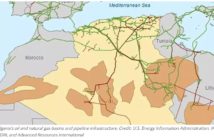Human Rights Watch
Photograph of Ahmed Benchemsi
Detained, Faced 10-Day Ordeal, But Not Charged
Algerian authorities deported a Human Rights Watch official, Ahmed Benchemsi, on August 19, 2019, Human Rights Watch said today. The authorities detained him for 10 hours and seized his passports, holding them for 10 days before deporting him.
Benchemsi, the Middle East communications and advocacy director at Human Rights Watch, had been in Algeria since August 1 on the organization’s behalf. The police detained him on August 9 at about 2 p.m. while he was observing the 25th consecutive Friday pro-democracy demonstration in downtown Algiers. They held him without allowing him to contact anyone, confiscated his cellphone and laptop computer, and ordered him to provide his passwords to unlock both devices, which he refused to do.
“Ahmed Benchemsi was in Algiers simply doing his job observing human rights conditions,” said Kenneth Roth, executive director of Human Rights Watch. “His arbitrary arrest and mistreatment send the message that authorities don’t want the world to know about the mass protests for more democracy in Algeria.”
Benchemsi entered Algeria lawfully and disclosed his professional affiliation when asked. He had visited Algeria three times previously since 2017 for Human Rights Watch, each time lawfully entering the country.
In an effort to end Benchemsi’s ordeal as quickly as possible, Human Rights Watch did not make a public announcement about his situation during the time that authorities prevented him from leaving Algeria.
After detaining Benchemsi on August 9 and releasing him around midnight, the police gave him a summons to return to the downtown police station known as “Cavaignac” on August 13. On August 13, the police did not tell Benchemsi of any charges against him or present a search warrant, but again demanded the passwords to his devices. When he refused, they gave him a summons to return the next day.
On August 14, when he reported to the police with an attorney, Salah Dabouz, the police demanded aggressively that he provide his passwords, which he again refused to do. After four hours, the police dismissed Benchemsi and summoned him to return the next morning to appear before the prosecutor.
On August 15, Benchemsi reported to the police in the company of Dabouz. The police made them wait eight hours without bringing Benchemsi before the prosecutor. At the end of the day, the police gave him a second summons to appear before the prosecutor on August 18.
On August 18, after having Benchemsi wait all morning, the police transferred him to the headquarters of the Police Brigade for Foreigners, where officials told Benchemsi that they might soon deport him.
Benchemsi remained in police custody overnight and was placed on a flight to Casablanca, Morocco on the afternoon of August 19. Algerian authorities returned his passports and electronic devices before he boarded the plane. He entered Morocco without incident.
At no time did Algerian authorities notify Benchemsi of any charges against him or the legal basis for confiscating and retaining his passports, phone, and laptop, or for demanding that he surrender the passwords to the devices. Nor did authorities provide the legal grounds for deporting him. Algerian news websites reported on August 18 that the prosecutor in Sidi Mhamed had ordered his expulsion, but Benchemsi never appeared before or spoke with a prosecutor.
The police at various times deprived Benchemsi of his ability to communicate with others, including his lawyer, and threatened him with physical violence, but did not physically mistreat him.
Since February, huge numbers of Algerians have marched every Friday in the streets of the capital and other cities, overwhelmingly peacefully, initially against the candidacy for re-election of President Abdelaziz Bouteflika and, after his resignation on April 2, for a transition toward a more democratic government.
Benchemsi is a dual Moroccan and US citizen. He had visited Algeria this August to monitor human rights developments in Algeria, especially those related to freedom of assembly and expression in the context of the pro-democracy protests. Algeria is among the more than 90 countries that Human Rights Watch monitors around the world.
“Benchemsi’s mistreatment is a sobering reminder of the risks faced every day by Algerian human rights defenders exposing and reporting on government abuses,” Roth said.







